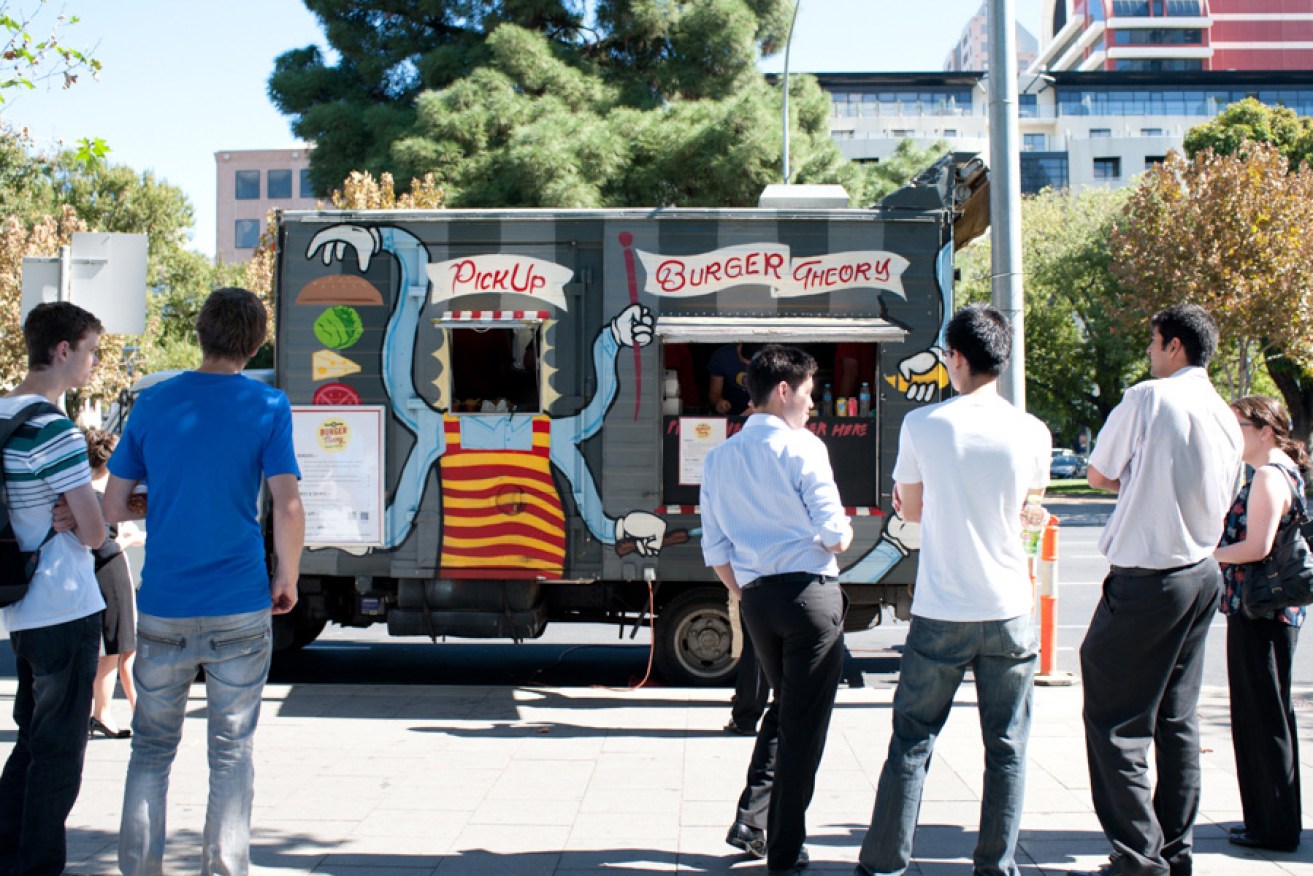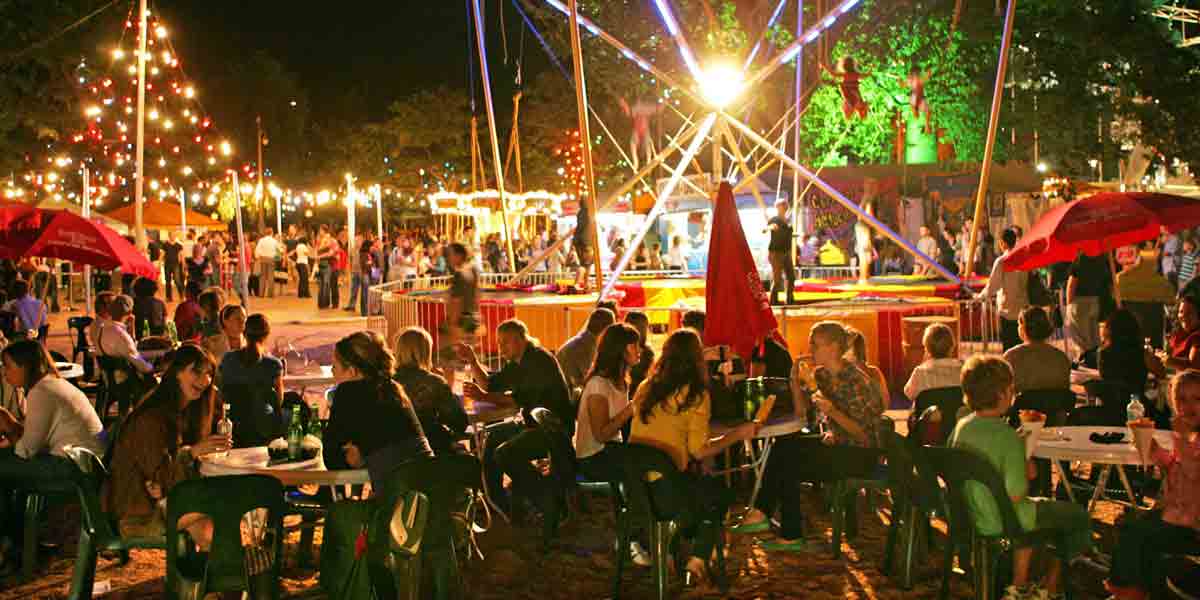Conservative Adelaide’s pop up hypocrisy

The Burger Theory food truck was in the vanguard of Adelaide's pop up culture. Photo: Nat Rogers/InDaily
“My business is being destroyed by that better business and it’s the Government’s fault”.
That’s the most-liked post from the satirical Facebook page Opposing Everything Because I’m From Adelaide which highlights the hypocrisy of conservatives’ opposition to change in our city.
This used to be the kind of town where things didn’t change. Where you had dined at every restaurant because they hadn’t changed in years. Where you could find a carpark on almost every street in the city because people didn’t leave the suburbs. Where “festival season” meant a fortnight every two years because that’s what had always happened.
There weren’t any small bars – or many big ones for that matter. The only food you could get from a truck was your morning milk delivery. And the huge start-up costs needed to start a business meant that we had clear intergenerational lines between bosses and workers.
Things have changed and almost all of our city has embraced that change. We’re proud to show it off to tourists – especially during footy season. International students love it and many former South Aussies are returning home from interstate to a transformed city.
But since they lost the fight on the tram extension, the new hospital, Adelaide Oval, the footbridge, small bars and the Festival Plaza, Adelaide’s famous nay-sayers are now turning their sights on “pop up” festival venues and food trucks.
The claims are that the Garden of Unearthly Delights, the Royal Croquet Club and the odd food truck are hurting ‘bricks-and-mortar’ businesses.
And if the conservatives on the Adelaide City Council are concerned about bricks and mortar, perhaps they should have a look at their own facilities like the Adelaide Central Market – a key tourist attraction that has managed to survive despite the lack of care and attention from its public owner, seemingly waiting for Soviet-style architecture to come back into fashion.
There’s no financial evidence or economic modelling presented that this is the case. It is just “the vibe” and the fact that one pub lessee that was struggling for years sadly went out of business.
Now the last time I checked we operate under a capitalist system. And under capitalism there will always be businesses both opening and closing. We can’t protect every business owner from ever going out of business – in fact it is the risk and reward proposition that makes capitalism work. It is particularly difficult for those staff members who are put out of work and must have their rights protected – but the fact remains that the businesses that best adapt to their customers wants and needs will thrive.
The good news is that our state has the second lowest rate of businesses becoming insolvent per person.
And as of last week there were 55 licence applications being advertised through the Liquor Licensing Commissioner – a dozen more than just a couple of weeks previously. There will soon be more and more bars and restaurants open around SA that you’ve never heard of.
The evidence also shows that business people and developers have done exciting things with ‘bricks and mortar’ in Adelaide. Take a look at the Mayfair Hotel, Peel Street and 2 King William Street, the modern apartment buildings rising up throughout town and soon to be the first 5-star hotel built in 30 years. This isn’t the sleepy Adelaide of old.
Yet some say that we need to protect the “bricks and mortar” businesses from competition from those that dare not to use bricks.
But why is “red tape” bad in every area of public policy except for food and beverage businesses? Why should these businesses be wrapped in regulation and protection and immune from the forces of a free market?
If a particular pub offers bad service, food, marketing and entertainment, there’s no reason why that business shouldn’t close and the building leased to someone who can run it better.
A successful business is not the bricks that hold it. This is increasingly so in the digital world: owning a property is not a pre-condition of having a business.
In my own electorate right now people are utilising broadband connections from their homes to connect with clients around the world. Others have businesses which produce goods to sell at many local markets. Others have food trucks. Others have function businesses. They all contribute to the economic development of our state. They all contribute to employment either by their own labour or by also employing others.
It has somehow been lost in the debate that places like the Garden of Unearthly Delights are comprised of dozens of small businesses. During the Fringe, those small businesses hired more staff and had the opportunity to reach new markets.
I particularly admire the gumption of the new pop up venue of arts vendors in Norwood that has called itself the “Bricks + Mortar Creative” – the conservatives won’t know what to do with that one.
And if the conservatives on the Adelaide City Council are concerned about bricks and mortar, perhaps they should have a look at their own facilities like the Adelaide Central Market – a key tourist attraction that has managed to survive despite the lack of care and attention from its public owner, seemingly waiting for Soviet-style architecture to come back into fashion.
Of course, there is more work to do to improve the environment for start-up businesses and entrepreneurs in South Australia and address some of the challenges. For example:
- The Government’s recently announced taxi review will look at how to further develop this industry and improve the outcomes for passengers and drivers with the potential for increased competition from new technology.
- A parliamentary committee is looking at how our small businesses and sole traders can take best advantage of the opportunities presented by the NBN.
- We must look at ways to overcome any further regulatory barriers – and there is clearly more to do to modernise liquor licensing, as anyone who has tried to drink a beer standing up can attest.
- We also must consider the implication of greater self-employment on those people’s ability to have income security for their family – compared to traditional jobs where you work 9-5 for a guaranteed pay check.
When state or local governments consider regulation it should be to protect the safety and welfare of the community and the even playing field of the market – not regulating to pick business winners.
People who claim to be pro-business, particularly those in elected office, should be supporting all businesses to start up and operate – not just supporting protectionism for some existing operations.
Chris Picton is a South Australian Labor MP representing the southern suburbs seat of Kaurna.





